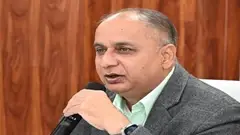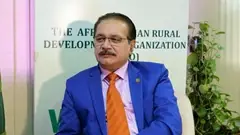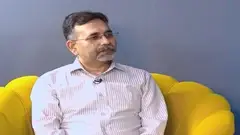
Over the years India has emerged as one of the world’s biggest producers of milk,with the total milk production rising from 120 million metric tonnes in 2010 to 165 million metric tonnes in 2017. Despite being the challenges of the highly unorganized small and marginal dairy farmers, Indian dairy sector has attracted several companies,entrepreneurs and investors. There is a growing demand for safe, nutritious, health-promoting convenience milk products calling for value addition, product diversification and complete quality assurance. The ICAR-National Dairy Research Institute (ICAR-NDRI) has played assign ficant role in strengthening the dairy industry through innovative technologies and human resource development. Dr. R R B Singh, Director,ICAR-NDRI speaks to Agriculture World.
Excerpts:
The scenario of Dairy Education in India.What are the prospects for those studydairying?
Dairy education in India has a long history.It started with the establishment of ImperialInstitute of Animal Husbandry and Dairying in 1923 at Bangalore. It was expanded and renamedas Imperial Dairy Institute in 1936 and was known as National Dairy Research Institute after independence in 1947. Subsequently, in
1955, NDRI Headquarter was shifted to Karnal Facilities at Bangalore were retained to function as a regional station to serve the southern states.
Another regional station is at Kalyani to serve the cause of dairying in the eastern states.Initially, we started with a certification course which later developed into several other higher education degrees and in 1957 we started with graduation programme. It was a three-year course then and now becomes four-year degree programme. Now, we offer postgraduate courses in 16 disciplines and doctoral degree programmes in 15 disciplines. Besides, over the last couple of years, we have been offering two diploma courses,one in Dairy Technology which is being run by the Southern Regional Station and second one is
diploma in Animal Husbandry which is being run by the Eastern Regional Station at Kalyani, West Bengal. Usually, we admit 320-330 students a year.
At a given point of time, we have close to 1000 students who are mostly at Karnal and more than 150 students in other two regional stations. After 1960, Institute has produced over 125 Diploma holder, 700 dairy graduates, 3000 post graduates with specialisation at Masters level and 1500 post-graduates at Doctorate level in different areas of dairying. Professionals trained at this Institute man almost all leadership positions in Dairy Research, Education, and Development in the country. That is how we have been contributing to the capacity building programmes in the nation.
What are the major research achievements of NDRI? What are the outstanding NDRI Technologies?
One of the major contributions in this particular perspective is that we have developed two crossbreeds namely “Karan Swiss” and “Karan Fries”. Karan Fries has been majorly responsible for revolutionising milk production in Punjab,Haryana and nearby areas. This has multiplier effect and these breeds have also presence in other parts of the country. Over the last couple of years,we have been focusing on rearing indigenous breeds and also on developing superior germ plasm of Sahiwal and Tharparkar. Besides that, we also have developed several formulations of are as pecific mineral mixtures which are critical for both reproduction and animal health.
In recent times, ICAR-NDRI has developed innovative solutions to address the problem of quality of milk by developing a new generation methods for detection of adulteration and contaminants in milk.. Similarly, we have been successful in developing paper based strips for rapid detection of pesticides and antibiotic residues in milk.
ICAR-NDRI is making efforts in commercialising the technologies developed at the Institute and in last
five years we have transferred about 80 technologies to the end users.
Significance of value addition in the dairy sector?
You must have come to know through newspapers that these days milk prices are going down.
The industry is in dire stress. One of the primary reasons for this situation is the large surplus of skimmed milk powder. International prices of skimmed milk powder are very low and there fore we are unable to export. Usually, we export 1 lakh tonnes of skimmed milk powder. Skimmed milk powder and butter are the major dairy products that we can make such products whenever there is surplus milk. But if there is a price crash, we will become helpless. Therefore, in our opinion to make the dairy enterprise profitable, diversification of milk products is the major solution.
That means more opportunities for manufacturing products which can be taken to the market or can be offered to the consumers. Nowadays there is a great demand for functional foods and is one of the areas in which this diversification can be achieved. We continued to offer to the industry a large range of value added products. Usually,these are taken to industry by organizing Institute-Industry meet every year.
How NDRI is contributing to Nation’s growth?
As the premier Dairy Research Institution, NDRI undertakes research, teaching and extension activities towards dairy development in the country. Being the National Institute, it conducts basic and applied research with the objective to enhance animal productivity and also to develop cost-effective technologies for the benefit of the teeming millions. Further, the Institute provides high-quality manpower to meet the human resource requirements for the overall dairy development in the country. The Institute also undertakes extension programmes for transferring the know-how from the laboratory to the farmers’fields.

Information generated at the Institute and the services offered have contributed to the growth of Dairy Industry as a whole and well-being of millions of milk producers and consumers of milk and milk products. Realizing the challenging need of global Dairy Trade, the Institute is continuously working to develop its R&D and HRD programmes to better serve the nation in terms of food security,employment generation, poverty alleviation and economic prosperity.
Relationship between NDRI and farmers. Especially, what are the major contributions towards women
farmers’ economic empowerment?
NDRI majorly caters to three major sectors in the Dairy Sector. One is the industry as such, second is research and development institutions and third is farmers. We have direct interface with farmers and organise outreach programmes for farmer community. For example, there is “Farmer First”programme in which our students and scientists are continuously interacting with the farmers. We also have “Farmers School” and every year we admit 20 farmers. Recently we have exclusively admitted women farmers and they have completed the programme. “Mera Gauv, Mera Gaurav” is one of the major flagship programmes of the Government of India under which our scientists and students regularly visit the villages and interact with them.
What are the strategies adopted to prevent adulteration in milk?
NDRI is working proactively for developing various analytical techniques and simpler methodology for the detection of adulteration in milk and milk products. A kit developed in the Division of Dairy Chemistry for the detection of various adulterants in milk is in high demand among dairy professionals and public analysts across the country. Off late, we have developed milk paper based strip tests for detection of common adulterants. These strip based methods are easy to use and can be done by dipping the strip in milk sample followed by visualisation of colour. The colour of the strip changes in the presence of adulterant in milk. We have also developed a rapid test for detection of adulteration of milk with so called synthetic milk. All these technologies have been adopted by many dairy industries and thus helping the common person in getting adulterate free milk.
What is the contribution of ICAR-NDRI skill development?
Business Planning and Development (BPD)Unit has been established at ICAR-NDRI to harness the scientific knowledge and innovation available at the institute for the benefit of farming community, entrepreneurs, students and industry. The unit supports industry as well as entrepreneurs with existing technologies,consultancy and business planning for dairy and food sector. Further, Technology Business Incubation (TBI) Center at ICAR-NDRI is a unique programme started in 2009. It provides all the necessary support and facilities required for a budding entrepreneur like infrastructure support,technology support, prototype development support, research assistance, help in getting funding, business consulting assistance, marketing assistance and any other consultation required to set up an enterprise. Over a year we have trained around 1600 youths and 175 of them have already started enterprises.What are the criteria for dairy studies offered at ICAR-NDRI?
The Institute has the distinction of being a Deemed University for implementing its academic programmes. We offer four tier academic programme. It starts with National Dairy Diploma in Dairy Technology/Animal Husbandry which is a two-year programme. Minimum qualification forad mission to all these courses is 10th or 12th level education. We also offer post-graduation courses in Dairy Processing discipline, Dairy Production discipline, and Social Science discipline. These students should have undergraduate degree either veterinary science or dairy science or basic science.We also offer Doctoral degree in 15 disciplines
for which the minimum qualification is post graduation in one of these relevant disciplines.
Institute also offers the prestigious Degree course leading to award of B.Tech (Dairy Technology).
The selection is based on the rank obtained in the common entrance examination (All India Entrance Examination-AIEEA) and the exam is conducted by Education Division of Indian Council of Agricultural Research. Students who have completed 10+2 with physics, chemistry and mathematics are eligible to choose this programme.
Compiled by Karthika B P with inputs from
Asha Sadasiv,
Usha Ramesh & Imran Khan















Share your comments